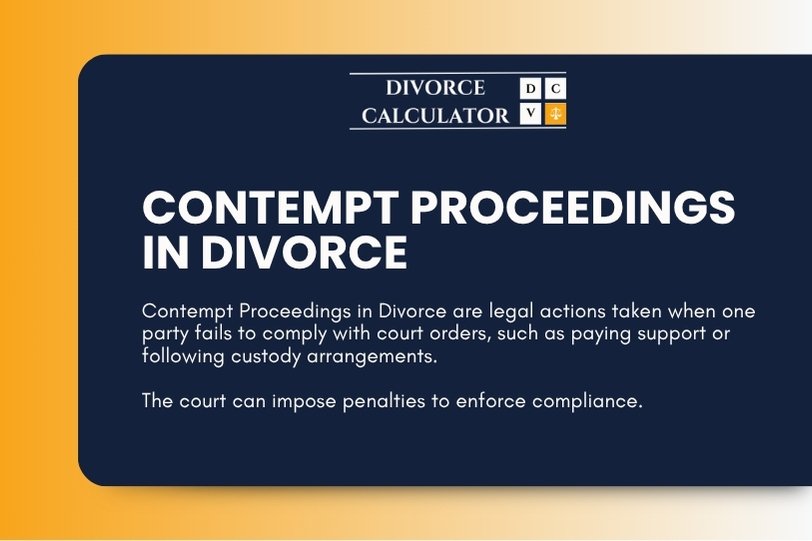Contempt proceedings are legal actions taken when someone disobeys a court order or shows disrespect for the court’s authority. We often encounter these situations in family law, civil cases, and even some criminal matters, where a party fails to follow a directive, such as paying child support or adhering to custody agreements.
Understanding how contempt proceedings work helps us protect our rights and ensures we comply with legal requirements. By knowing the possible consequences and steps involved, we are better prepared to avoid costly legal mistakes and resolve disputes efficiently.
Key Takeaways
Contempt proceedings are legal actions used to address violations of court orders or disrespect toward the court. We must understand the serious implications of being found in contempt, which range from fines to imprisonment.
We often encounter contempt in two main forms:
- Civil contempt: Used to enforce compliance with court orders.
- Criminal contempt: Punishes actions that disrespect the dignity or authority of the court.
| Type of Contempt | Purpose | Common Penalties |
|---|---|---|
| Civil Contempt | Enforce court orders | Fines, Compliance Jail |
| Criminal Contempt | Punish courtroom acts | Fines, Jail |
We have the right to be heard and defend ourselves during contempt proceedings. The court typically requires clear evidence before finding a party in contempt.
It is important for us to follow all court orders and communicate clearly if compliance is not possible. Seeking legal advice early may help us avoid unnecessary penalties.

Why It Matters In Divorce
Contempt proceedings play a crucial role in divorce cases when one or both parties fail to follow court orders. These orders might relate to child custody, support payments, property division, or visitation rights.
We often see situations where one parent refuses to pay child support or blocks the other parent’s access to the children. In such cases, contempt proceedings help ensure accountability and compliance.
When a court order is violated, these proceedings:
- Provide a formal way for us to address non-compliance
- Offer potential remedies, such as fines or even jail time
| Common Divorce Issues Leading to Contempt | Example |
|---|---|
| Missed child support payments | A parent skips monthly payments |
| Ignoring visitation schedules | One parent denies scheduled visits |
| Withholding property | Refusal to transfer agreed assets |
Enforcing compliance is essential because it supports fairness and the well-being of everyone involved, especially children. Without the ability to initiate contempt proceedings, court orders could be ignored without consequence.
We rely on these proceedings to maintain the integrity of our legal agreements and protect the rights of each party. This legal tool ensures that post-divorce arrangements are respected and enforced as intended.
Real-Life Examples
When we look at contempt proceedings, several real-world scenarios stand out. For instance, a parent may be held in contempt for failing to comply with a child custody order.
In courtrooms, witnesses or parties sometimes refuse to answer questions or provide required documents. Judges can issue contempt orders to uphold the authority of the court in these situations.
Below is a table summarizing a few notable examples:
| Case Type | Contempt Action | Outcome |
|---|---|---|
| Family Law | Non-payment of child support | Fines, potential jail time |
| Civil Litigation | Ignoring discovery orders | Monetary sanctions |
| Criminal Procedure | Disruptive behavior in court | Removal or detention |
Another example we often see is an attorney being found in contempt for disrespectful conduct during proceedings. This can include speaking out of turn or disobeying court instructions.
We may also encounter contempt proceedings during press coverage of high-profile trials. Journalists might be held in contempt for publishing restricted information.
Such examples help us understand how contempt proceedings serve as a tool to maintain integrity and order in legal settings.
How States Handle Contempt Proceedings
Each state uses its own statutes and court rules for contempt proceedings. As a result, requirements, penalties, and procedures may differ based on location and court structure.
New York
In New York, contempt of court is governed by the Judiciary Law, primarily Sections 750 through 773. We see two types of contempt: criminal and civil. Civil contempt aims to compel compliance with a court order, like paying child support or following an injunction. Criminal contempt punishes conduct that shows disrespect or disrupts the authority of the court.
A judge may impose fines, imprisonment, or both. For civil contempt, the goal is coercive, so someone may be jailed until they comply with the original order. For criminal contempt, a definite jail term or fine is imposed as punishment. New York courts generally require clear notice of the alleged contempt, an opportunity to respond, and sometimes a hearing, especially for serious matters.
Key features:
- Judges rely on affidavits or direct observation.
- Right to counsel may apply in criminal cases.
- Appellate review is available for contempt findings.
California
California distinguishes between direct and indirect contempt. Direct contempt occurs in the immediate view and presence of the court, such as during a hearing. Indirect contempt refers to violations happening outside the courtroom, often involving failure to obey court orders.
California courts must provide notice and a hearing for indirect contempt. The process is governed by the Code of Civil Procedure §§ 1209-1222. We note that defendants in contempt matters may have the right to counsel, especially if jail time is possible. Sanctions range from fines to brief jail terms, depending on the seriousness and nature of the contempt.
Notably, California emphasizes procedural safeguards. For example:
- Written charges must be issued for indirect contempt.
- The accused gets an opportunity to answer.
- In family law, contempt proceedings are common for child and spousal support enforcement.
Texas
Texas law separates contempt into civil and criminal, similar to other states. The Texas Government Code and Texas Family Code outline key processes. In civil contempt, the court may detain someone to compel them to follow a previous order, while criminal contempt focuses on penalizing disruptive or disrespectful behavior.
We observe that Texas courts may conduct contempt hearings with or without a jury, depending on circumstances and the possible penalties involved. Civil contempt can lead to indefinite confinement—provided the contemnor has the ability to comply and purge the contempt. For criminal contempt, the sentence is usually a fixed term.
Highlights:
- Notice and hearing are required.
- The right to counsel is recognized when incarceration could result.
- Appeals are possible, with expedited review in some family law contexts.
Florida
Florida distinguishes between direct and indirect contempt based on where the act occurs. Direct contempt happens in the presence of the court and can be punished summarily. Indirect contempt, such as violating court orders outside the courtroom, requires more formal proceedings.
Florida’s Rules of Criminal Procedure and Family Law Rules of Procedure establish detailed steps. We must serve the accused with notice, set a hearing, and allow time to prepare a defense. Punishments can include fines, incarceration, or both, and Florida requires a finding of ability to comply before imposing jail for civil contempt.
Notable Florida procedures:
- Judges must make written findings specifying contemptuous acts.
- Right to counsel applies if jail is possible.
- Contempt is frequently used to enforce support or custody orders.
Tips If You’re Dealing With Contempt Proceedings
When facing contempt proceedings, we need to respond carefully and promptly. Acting quickly helps protect our rights and shows the court that we take the matter seriously.
Keep detailed records. It’s important to collect all communications, court orders, and evidence that support our position. We should organize documents, emails, texts, and other relevant materials.
Follow court orders as closely as possible. If there are challenges with compliance, we must document our reasons and efforts. Failing to follow clear instructions without explanation may hurt our case.
Seeking legal advice is often essential. We may want to consult a qualified attorney to guide us through the process, explain the implications, and represent our interests.
Do:
- Arrive on time to all scheduled court hearings.
- Dress professionally.
- Address the judge respectfully, even under stress.
Don’t:
- Argue with the opposing party in the courtroom.
- Ignore any summons or deadline from the court.
We should avoid discussing the case in public or on social media, as this could be used against us. Remaining respectful and professional helps us present our position clearly and effectively.
Frequently Asked Questions
We address key issues related to contempt proceedings, including definitions, legal categories, potential sanctions, and the processes involved. Specifics on the potential legal outcomes and procedural steps are also covered.
What constitutes civil contempt of court?
Civil contempt occurs when a person fails to comply with a court order intended to benefit another party. We often see this in cases involving unpaid child support or failure to respond to subpoenas.
The principal goal of civil contempt is to compel compliance with the court’s order rather than to punish past actions.
What are the different categories of contempt?
There are two primary categories: civil contempt and criminal contempt. Civil contempt is coercive or remedial, usually aimed at enforcing compliance with a court order.
Criminal contempt, on the other hand, is punitive. It addresses actions that disrespect or obstruct the authority or functioning of the court.
How is contempt of court sanctioned in the United States?
Courts may sanction contempt through various penalties, including fines, incarceration, or both. The nature and severity of the sanction generally depend on whether the contempt is civil or criminal.
Sanctions are intended to either enforce compliance or punish misconduct, based on the facts of the case.
Can contempt of court lead to incarceration, and if so, for what duration?
Yes, incarceration is a potential consequence for both civil and criminal contempt. In civil contempt, imprisonment may last only until the individual complies with the order in question.
For criminal contempt, the court can impose a definite jail term. The length typically depends on the seriousness of the offense and statutory limitations.
What is the procedure for initiating contempt proceedings?
Contempt proceedings usually begin with the filing of a motion or petition in court. The accused party must then be notified and given an opportunity to respond or appear at a hearing.
We may present evidence or testimony during the hearing before the judge decides whether contempt has occurred and what sanctions, if any, are appropriate.
Does a contempt charge equate to a misdemeanor or a felony offense?
Contempt of court is generally classified differently from traditional crimes. It is neither strictly a misdemeanor nor a felony by default.
However, certain acts of criminal contempt may be prosecuted as misdemeanors or felonies, depending on the nature of the conduct and the specific laws of each jurisdiction.



